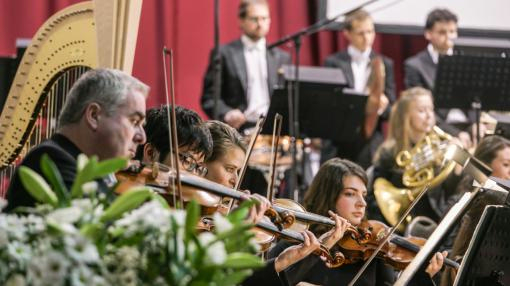If you went to the Brno Philharmonic’s New Year Concert expecting a serious, rigorous celebration, with measured and distinguished entertainment, most probably you left extremely disappointed. In your frustration you may have complained and muttered: what was this conducting dance creation, why did they clap to the rhythm of the Radetzky March and primarily – why were we made to sing? And the programme! Last year at least there was Smetana, but this year? Just waltzes and polkas, operettas and whipped cream! If you are not a bitter grouch, it is likely that along with the Brno Philharmonic you danced into 2018 with ease and sprightliness.
The evening entitled Greetings from Vienna to the World was put together mostly from famous works by the Strauss family – The Radetzky March by Johann the Elder, the overture to the operetta Die Fledermaus by Johann the Younger, the fast polka Without a Care by Josef Strauss or for example the Whipped Cream Waltz by Richard Strauss. This Strauss monopoly is at the root of Straussiana by Erich Wolfgang Korngold, Waltz by Leonard Bernstein, the composition Jazz Pizzicato by Leroy Anderson, the Pushkin Waltz by Sergey Prokofiev and the Polka by Dimitri Shostakovich. Due to the insufficient capacity of the hall the concert was performed twice in one day – the subject of this review at 4 p.m. and later at 8 p.m. with a slightly expanded programme. The performance was led by Caspar Richter – a conductor who gave the concert its distinctive form. Whether the evening concert was held in a different spirit I am unable to judge.
It is totally normal that here and there a conductor stamps to the beat, jumps or even dances, however few involve the audience in such a degree of interaction as in the New Year concert of the Brno Philharmonic. Not only did the conductor Caspar Richter brilliantly communicate with the whole orchestra, but he also turned his attention to the listeners. At first in their confusion that did not know what the conductor wanted, but the hall soon adapted and more or less accurately clapped and even sang along in two languages. There were a great many German-speaking listeners in the hall, and so alongside the Czech version of songs (Pes jitrničku sežral) there was also the original. The occasional exclamation from the conductor and orchestra only underlined the evident exaggerated nature of the concert. Despite the undeniable joviality the musical interpretation did not suffer. The musicians performed all the works with obvious mastery and the humour was not forced. Rather it was clear that the orchestra were also having fun and the smiling faces of symphonic-jokers shone from individual sections. Perhaps only the Waltz from the Divertimento for Orchestra by Leonard Bernstein came across a little uncertain and in the same way the conclusion was not completely coherent. What however was a clear success was above all the resulting expression of all the musical works. The conductor Caspar Richter has great experience with the repertoire and the Brno Philharmonic put everything necessary into the performance in terms of gentle waltzing and overall dancing finesse. Arching melodies, playful clipped staccato, gently pizzicato, intonation, length of tones – everything was polished to elegance.
As indicated above, the focus of the evening was waltzes, polkas and famous melodies from operettas and ballets. It was not about complete works but rather selected pearls. This solution offers a wide variety of programmatic choices which organisers could take listeners to various continents and highlight the diverse musical currents of the 19th and 20th centuries. The result remained somewhat tame. It is hard to fault the programme creators for giving so much attention to waltzes – after all for many people it is Vienna’s main export. Also understandable are the big names on the list of composers. Yet still there is still the idea that the resulting programme could be bolder, and although I do not call for fundamentally modern music, which on New Year’s Day would find only a few advocates among listeners, I believe that most of us visitors today got out of bed to the typical rhythm of a Strauss waltz. And it is not even a problem of the works themselves. Some real gems were chosen – Straussiana by Erich Wolfgang Korngold, the Waltz from the Divertimento for Orchestra by Leonard Bernstein or the magical waltz Viennese Blood by Johann Strauss the Younger. It was only desirable to slightly disrupt this parade of elegant dances. The one true contrast was the Polka from the ballet The Golden Age by Dimitri Shostakovich, which with its modern musical language and courageous rhythms represented a welcome clarification of stagnant waters. But enough of misanthropy.
Brno Philharmonic began the New Year with fresh jokes, dancing and elegance. It would be difficult to find listeners who on the evening would not have smiled at the dance antics of the conductor or who for at least a moment did not find themselves carried away to the dance halls of the music-loving palaces of the 19th or 20th century.
Johann Strauss the Younger: Die Fledermaus, overture to the operetta; Viennese Blood waltz; It Was Beautiful from the operetta Waldmeister, Drollery polka; Emperor Waltz
Johann Strauss the Elder: Memories of Ernst, fantasy; Furioso-Galopp; Radetzky March
Josef Strauss: Without a Care, fast polka
Richard Strauss: Whipped Cream Waltz, from the ballet Whipped Cream (Schlagobers)
Erich Wolfgang Korngold: Straussiana, Polka
Leonard Bernstein: Divertimento for Orchestra, second part - Waltz
Leroy Anderson: Jazz Pizzicato
Sergey Prokofiev: Pushkin Waltz No. 1
Dimitri Shostakovich: Polka from the ballet The Golden Age, Brno Philharmonic, conductor: Caspar Richter, written from the afternoon concert 1/1/2018
































No comment added yet..